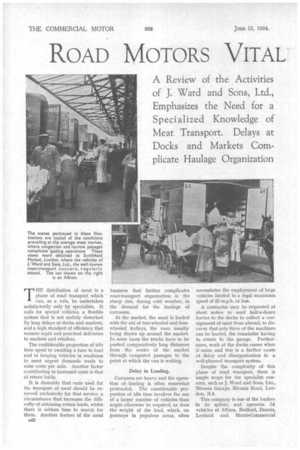ROAD MOTORS VITAL TO THE MEAT TRADE
Page 56

Page 57

If you've noticed an error in this article please click here to report it so we can fix it.
A Review of the Activities of J. Ward and Sons, Ltd., Emphasizes the Need for a Specialized Knowledge of Meat Transport. Delays at Docks and Markets Com plicate Haulage Organization
rIn HE distribution of meat is a phase of road transport which can, as a rule, be undertaken satisfactorily only by specialists. It calls for special vehicles, a• flexible system that is not unduly disturbed by long delays at docks and markets, and a high standard of efficiency that ensures rapid and punctual deliveries to markets and retailers.
The corlsiderable proportion of idle time spent in awaiting a turn to load and in keeping vehicles in readiness to meet urgent demands tends to raise costs per mile. Another factor contributing to increased costs is that of return loads.
It is desirable that vans used for the transport of meat should be reserved exclusively for that service, a circumstance that increases the difficulty of obtaining return loads, whilst there is seldom time to search for them. Another feature of the meat business that further complicates road-transport organization, is the sharp rise, during cold weather, in the demand for the haulage of carcasses.
At the market, the meat is loaded with the aid of two-wheeled and fourwheeled trolleys, the vans usually being drawn up around the market. In some cases the trucks have to be pushed comparatively long distances from the centre of the market through congested passages to the point at which the van is waiting.
Delay in Loading.
Carcasses are heavy and the operation of loading is often somewhat protracted. The considerable proportion of idle time involves the use of a larger number of vehicles than might otherwise be required, as does the weight of the load, which, on journeys in populous areas, often necessitates the employment of large vehicles limited to a legal maximum speed of 20 m.p.h. or less.
A contractor may be requested at short notice to send half-a-dozen lorries to the docks to collect a consignment of meat from abroad, to discover that only three of the machines can be loaded, the remainder having to return to the garage. Furthermore, work at the docks ceases when it rains, and this is a further cause of delay and disorganization to a well-planned transport system.
Despite the complexity of this phase of road transport, there is ample scope for the specialist concern, such as J. Ward and Sons, Ltd., Birnarn Garage, Birnam Road, London, N.4.
This company is one of the leaders in its sphere, and operates 54 vehicles of Albion, Bedford, Dennis, Leyland and Morris-Commercial
makes, as well as a Carrimore and two Dyson trailers, the total unladen tonnage being 1fZ. The last-named figure is rather lower than that which obtained during the year ended March 31, 1933 (the basic year under the Road and Rail Traffic Act, 1933), but 15 new 3-ton lorries and three 4-tonners art to be acquired.
Included in the fleet are several chain-drive Albions which were first registered in 1921. They are engaged on short-distance work and continue to give reliable service.
The business was built up from a one-horsed cart, which Mr. J. Ward, governing director of the present concern, purchased many years ago, when his humble headquarters were at Durham Road, Finsbury Park, London. The modern garage in Birnam Road is extensive and includes bodywork and repair shops, and a spare-parts storeroom.
The company builds its own insulated van bodies and, during a recent visit, a representative of The Commercial Motor witnessed the fitting of Alfol insulating material to a body which was under construction on an Albion forward-control chassis. The vans range in carrying capacity from 1 ton to 6 tons, and some of them are equipped with Flettner air extractors.
OA-engine Experiments.
Experiments are being carried out with a Gardner 5L.W.-type oil engine in a Leyland chassis. Incidentally, the company took delivery of one of the first vehicles supplied by Smith's Commercial Vehicles, Ltd. —a Dennis
40-45-cwt. van, the short wheelbase and small turning circle 'of which make it particularly suitable for work in congested dock and Market areas.
CarcasseA are collected mainly horn Lincolnshire and are carried to Smithfield Market, London.. The retail-distribution vehicles leave the garage at about 6 a.m., and proceed to Smithfield. Flom this centre J. Ward and Sons, Ltd., delivers meat to retailers throughout London and at seaside towns in an area ranging from Hull in the north-east to Plymouth in the south-west, other important towns being served en route. These journeys are made daily, the
vans covering regular routes and usually travelling light in one direction.
Another aspect of the business is the collection of consignments of meat from the London docks, and in this connection the three trailers are employed. From the docks meat is conveyed to markets in many parts of the Kingdom, including Cardiff,
-Newport, Pontypridd, Swansea, Bristol, Plymouth, Southampton, Brighton, Birmingham, Hull, Manchester, Liverpool, Sheffield and Leeds.
Three years ago, a regular daily service from Devon to London for the transport of eggs and poultry was inaugurated, a total of eight vans now being engaged upon it. The company has a depot at Uffetilme, and a van collects the products of farms in various parts of the county, carrying them to the depot to be transferred to the trunk-service vehicles, which• leave at about 6 p.m. and arrive at Smithfield and Spitala fields Markets at 4 a.m.
Particularly in connection with a perishable commodity, such as meat, is the door-to-door service provided by road transport of marked value to the general public. It is probable that the development of the commercial motor has played a more important part in the improvement in the quality of food retailed in towns than has any other factor.




























































































